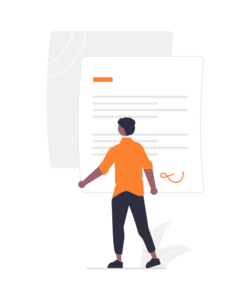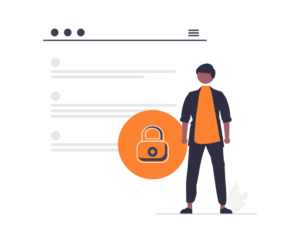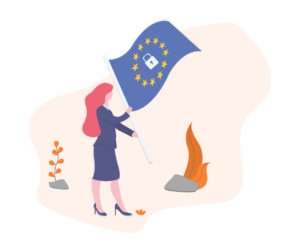Overview
Legally owning an app requires understanding and implementing several key legal protections. Essential steps include Non-Disclosure Agreements (NDAs) to safeguard your ideas during collaborations, and securing copyright to protect your app’s code, design, and content. It also discusses trademark registration to ensure your app’s brand identity is uniquely yours and patents for protecting innovative functionalities. Comprehensive documentation and robust security measures are crucial for maintaining control and complying with regulations. By addressing these aspects, you can solidify your app’s legal foundation, ensuring it remains protected and competitive in the market.
Protect Your Idea with NDAs

Non-disclosure agreements (NDAs), also known as confidentiality agreements, are legal contracts that prohibit someone from sharing proprietary or confidential information. NDAs are critical for protecting your app idea during the development process.
When should you use an NDA?
You’ll want to use NDAs anytime you need to share sensitive details about your app with others, such as:
- App developers, designers, or other contractors
- Potential business partners
- Beta testers
- Investors or advisors
Requiring NDAs ensures anyone you share confidential information with cannot use it without your permission or reveal it to competitors and this is essential to ensuring you legally own your app and all of it’s intellectual property.
Key NDA provisions
Your NDA should clearly define what information is considered confidential and how it can be used. Be sure to include:
- Definition of confidential information
- Obligations to keep information secret
- Restrictions on using or sharing information
- Length of confidentiality (e.g. 2 years)
- Remedies if the agreement is breached
With strong NDAs in place, you can securely share your app idea without worrying about it being stolen or copied. Consult an attorney when drafting NDAs to ensure they fully protect your rights.
Copyright

Copyright is a form of intellectual property that protects original works including literary, dramatic, musical, and artistic works. This applies to the source code that makes up a software application.
Copyright protects the expression of ideas, not the ideas themselves. For example, the code you write to create your app would be protected, but the general idea or functionality of your app is not.
Copyright protection arises automatically when you create an original work. You don’t need to register or file anything to obtain copyright for your app’s code. The copyright exists from the moment the original code is written down in fixed form.
While registration is not required, there are some key benefits to registering your copyright:
- Registration establishes a public record of your copyright claim. This can serve as evidence of your ownership in court.
- You can file suit in court for infringement of a registered work. Registration must occur before infringement to qualify.
- If made within 5 years of publication, registration can qualify you for statutory damages and legal fees in an infringement suit.
So while copyright registration is optional, it does provide additional legal protections that may be beneficial if you ever need to enforce your rights. The process involves filing an application, depositing copies of your work, and paying a fee.
Trademark Your App’s Name and Branding
Trademarking is a important step in legally owning your app and establishing your brand identity in the marketplace. A trademark protects any names, words, slogans, logos, symbols, or a combination of these elements that identify your goods and services.
For an app, you’ll want to trademark your app’s name, logo, and any branded slogans or taglines associated with the app. Trademarking prevents others from using identical or confusingly similar names or branding elements for their own apps or products.
Before selecting a name for your app, it’s essential to search the UK Intellectual Property Office (UKIPO) database to ensure another registered trademark doesn’t already exist. The UKIPO offers a free trademark search service to search for registered trademarks. You can also conduct a web search to catch unregistered trademarks.
Once you’ve selected and cleared an app name, you’ll need to file an application with the UKIPO to register your trademark. The application process involves submitting your name, logo, and goods/services description, paying a filing fee, and awaiting examination.
If approved, your UK trademark registration will be valid for 10 years and renewable indefinitely, as long as you maintain use of the mark. Registering your trademark provides nationwide legal protection and the ability to bring infringement claims in court. It also acts as a deterrent to potential infringers.i
Consider Patenting Novel Features or Processes
Patents provide legal protection for new inventions and innovative ideas. While copyright and trademarks protect creative works and brands, patents protect the novel functionality and technical processes behind an invention.
When developing a new app, it’s important to determine if your app contains any patentable features that provide a new way of doing something or a technical improvement over existing solutions. Here are some key considerations around patenting app features:
What can be patented?
To be patentable, an app feature must be useful, novel, and non-obvious. The feature should provide some functional benefit and represent a meaningful advancement over existing technology. Purely aesthetic elements or abstract ideas are not patentable.
Is your feature truly novel?
Conducting a patent search is crucial to see if your idea already exists. Just because your app feature is new to you does not mean someone else hasn’t already invented, used, or patented it. A patent attorney can help thoroughly search databases of existing patents.
Would your feature be obvious to others skilled in the field?
Even if a feature is novel, it may still not be patentable if it represents an obvious extension of existing technology in the eyes of other app developers. The non-obvious criteria helps ensure patents reward truly inventive contributions.
What types of app features can be patented?
Some examples include new interface designs, data processing algorithms, file compression techniques, network communication protocols, security features, and innovative ways of displaying or interacting with data.
What is the patent application process?
You’ll need to file a patent application with the U.S. Patent and Trademark Office. The application includes background information, illustrations of your invention, and claims defining the scope of protection. A patent examiner will assess if your app meets all the requirements for patentability. The process often takes 2-3 years.
Is it worth the cost?
Pursuing a patent costs thousands of pounds in lawyers fees and filing costs. For many app developers, the benefits of protecting small-scale features may not outweigh the significant expense. However, patented features can provide a competitive advantage and additional revenue stream through licensing.
Carefully evaluate if your app contains any stand-out features that are worth the investment of time, money, and effort that goes into the patent process. Consult an intellectual property lawyer for guidance specific to your invention. With the right planning, patents can be a powerful tool for protecting your hard work and creativity.
Pick Reliable Development Partners
Choosing the right development partner is crucial to protect your app idea and maintain full ownership. You want to partner with experienced developers who understand and respect intellectual property rights. Be sure to properly vet potential partners.
Look for developers with a proven track record of releasing successful apps while protecting client IP. Examine their portfolio and client testimonials. Ask about their experience with patents, trademarks, copyrights, and NDAs. Gauge their understanding of IP issues unique to software and apps.
Prior to engagement, have potential partners sign an NDA. This ensures they cannot disclose or profit from your confidential information. Clearly define ownership of all work product produced. The contract should state you retain exclusive rights to the app, code, designs, documents, and IP.
Negotiate favourable financial terms. Do not let partners retain rights to your IP as a condition of compensation. Be wary of unfavourable clauses around IP ownership, licensing, attribution, warranties, and liability. Consult an attorney to review any partnership agreements.
Vetting development partners thoroughly and formalising the relationship contractually helps retain legal ownership of your app idea. Look for seasoned professionals who grasp the intricacies of intellectual property law. With the right partner, you can protect your vision while bringing your app to life.
Create Thorough Documentation

Comprehensive documentation is a critical part of legally owning and protecting your app. Here are some key steps to take:
Document the code and design decisions thoroughly. Maintain detailed records of the code you write and the design decisions you make during development. Comment your code extensively to explain the logic and architecture. Document wireframes, UI/UX design, workflows, and other elements of the app design.
Keep clear records of ownership. Make sure you have documentation that clearly establishes your ownership over all aspects of the app, including the code, branding, graphics, data, and other intellectual property.
Use documentation to support any IP claims. In the event you need to enforce your intellectual property rights, your documentation can serve as valuable evidence of your ownership and creation process. Detailed code comments and design docs make it easier to prove your IP rights.
Thorough documentation not only aids the development process, but also provides legal protection. By comprehensively recording your work, you establish a paper trail that proves your app ownership. Maintaining meticulous documentation makes it more difficult for others to dispute your IP rights or claim ownership themselves. Invest time in creating complete records and your documentation will pay dividends in legally safeguarding your mobile app.
Implement Rigorous Security

Securing your app’s code and data is crucial to maintaining full ownership and control. You’ll want to implement robust measures to prevent unauthorised access or theft of your intellectual property.
Protect your source code by storing it in encrypted repositories, requiring strong authentication for access, and limiting access to only essential personnel. Never leave your code publicly exposed on sites like GitHub.
Use encryption for any data transmission or storage. Encrypt app data both in transit and at rest. Properly hash and salt any passwords.
Implement secure authentication using methods like OAuth and multi-factor authentication. Require strong passwords and auto-logout after periods of inactivity.
Restrict access with principles of least privilege. Only allow the minimum necessary access for each user role.
Monitor activity by logging access attempts, changes, and anomalies. This creates an audit trail should any security incidents occur.
Keep everything updated including operating systems, frameworks, libraries, and dependencies. Apply security patches promptly to fix vulnerabilities.
Consult security best practices and OWASP guidelines. Have your code reviewed by security professionals. Test for vulnerabilities and fix any issues.
Back up critical data redundantly in geographically separate locations. Backups should be encrypted and access limited.
Rigorous security is a key part of protecting your intellectual property and maintaining full legal ownership of your app. Investing in security from the start will pay dividends down the road.
Watch for Infringement

After launching your app and following all the steps to ensure you legally own your mobile app, it’s important to remain vigilant and watch for potential infringement of your intellectual property rights. Here are some tips:
Search for infringement regularly: Conduct searches on app stores, websites, and anywhere else apps can be distributed. Look for apps with similar names, branding, or functionality that could infringe on your rights. Search code repository sites for unauthorised copies of your source code.
Take action on infringers: If you find an infringing app, start by sending a formal cease and desist letter. Explain how they are infringing and request they voluntarily remove the infringing content. If they don’t comply, you may need to file a lawsuit and get a court order forcing them to stop.
Get legal help if needed: If you encounter willful or serious infringement that won’t stop voluntarily, you may need to get legal counsel involved. An IP lawyer can help craft effective cease and desist letters, file lawsuits, and represent you in legal proceedings. Having an experienced lawyer increases your chances of successfully enforcing your rights.
Document everything: Keep detailed records of any potential infringement you find and all actions taken. These records will be crucial evidence if you do end up in legal proceedings. The more evidence you have, the stronger your case will be.
Remaining vigilant and protecting your intellectual property is key to fully owning your app legally. Don’t let infringement go unchecked – take prompt action to defend your app ownership rights. With persistence and legal help if necessary, you can force infringers to stop and recover damages in court.
Stay Compliant with UK Regulations

Launching an app comes with significant legal and regulatory obligations that founders must understand. Staying compliant can prevent major headaches down the line.
When building your app, research what laws and regulations may apply given your location, industry, and business model. For example, apps dealing with financial services, healthcare, education or other regulated sectors may have special compliance requirements in the UK.
Data privacy regulations like the General Data Protection Regulation (GDPR) in the EU and the Data Protection Act 2018 in the UK impact how apps can collect, store and use user data. Stay up to date on relevant privacy laws and implement data handling practices accordingly.
Accessibility is another area of compliance for apps. Laws like the Equality Act 2010 in the UK require apps to be accessible to those with disabilities. Consider accessibility from the start and test your app to identify any compliance gaps.
Beyond app functionality, also ensure compliance in your terms of service, privacy policy, and any public-facing information. Consult a lawyer to review these materials to avoid legal issues.
As regulations frequently change, regularly check for new requirements and update your app as needed. If any aspect seems unclear or risky, don’t hesitate to seek legal counsel. Being proactive about compliance can save you significant problems down the road.
Establish a Business Entity

When developing an app, it’s crucial to consider establishing a formal business entity to legally own it, rather than simply owning it as an individual. There are a few options to consider:
Sole Trader vs. Limited Company
A sole trader is the simplest business structure in the UK, where you and the business are considered one entity. The app would legally be owned by you as an individual. While easy to set up, sole traders offer no liability protection – you are personally responsible if legal issues arise.
Forming a limited company separates your personal assets from the business. If the app faces legal trouble, only the company’s assets are at risk. Limited companies limit personal liability, but have more complex tax filings and paperwork. If you opt for a limited company, the business will legally own and have all rights to the mobile app.
Liability Considerations
Limited companies shield your personal assets if the business is sued. With sole traders, you have unlimited personal liability. Consider the app’s industry and potential risks. A limited company may be advisable for apps handling sensitive user data or financial transactions.
Tax Implications
Limited companies are taxed differently than sole traders. Limited companies pay Corporation Tax on profits, while sole traders pay Income Tax on profits. Consult an accountant on the best structure for your situation.
Establishing a limited company or operating as a sole trader allows you to legally separate app ownership from your personal finances and assets. Weigh liability protection against tax complexity and legal fees when choosing a business structure.
If you need further advice on how you can legally own your mobile app or any digital product, get in touch with our expert team today.
